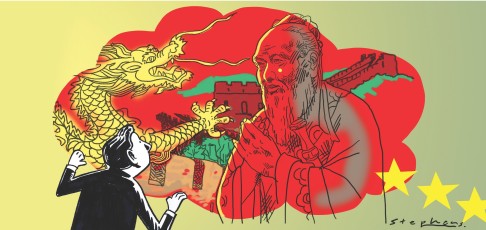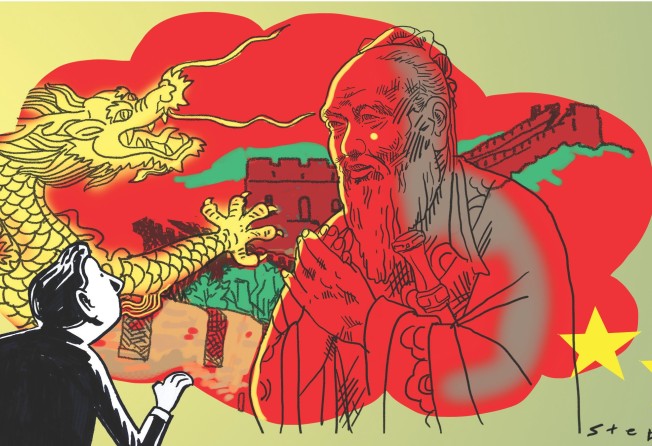
The English translation of The China Dream was published in the United States this summer. The bestselling book, the work of retired PLA colonel Liu Mingfu, sets out how China can usurp the United States as the No 1 nation.
Niv Horesh says to know the Chinese psyche, the West should read a bestseller by a retired PLA colonel


Much of the Western media and many China watchers have been quick to dismiss Liu as a typically loose-lipped People's Liberation Army commissar: triumphalist, anti-American, hawkish and conspiracy-obsessed. But while there are flaws in Liu's overarching arguments, a more complex picture lies behind the bluster.
Although the approach of China's foreign-policy establishment is cagier than Liu's provocative style, China has adopted a much bolder and more assertive posture on the world stage under President Xi Jinping . Liu's hugely popular book both reflects and shapes public opinion in China - and Chinese public opinion is, in turn, exerting a rising influence on foreign policy, as China scholar James Reilly explains in his book Strong Society, Smart State.
So when the West brushes aside a book like The China Dream, it is spurning the opportunity to develop a greater understanding of the Chinese view of the Western world - and why China is confident that it can indeed supplant the US.
It is also missing the point that many others share Liu's ideas, from Chinese thinkers on international relations to the general public. His views do not represent just PLA old-timers but a broad cross-section of China's younger, more confident intelligentsia, for example, voices like that of outspoken Shanghai venture capitalist Eric X. Li. One key criticism of Liu is that he prefers to gloss over the horrors of the Mao era in constructing a bold narrative of national revival, but in that sense he is no different to many ordinary Chinese.
The China Dream, then, is a revealing window into the Chinese psyche. Liu's position is often cast in the West as overtly militaristic. But it is more nuanced than that. His militaristic streak is a counterweight to what he sees as China's excessive passivism through its over-reliance on a Confucian "scholarly-civilian" ethos. This is an idea shared by Tiananmen democracy movement veteran Jiang Rong in his novel Wolf Totem. Liu is not calling for military power alone - but for the right balance between military and economic power.
Underlying Liu's narrative is a frustration often expressed in private by many Chinese: China is big and populous, has an illustrious history and stellar reform achievements. Yet, it is still punching well below its weight on the world stage from sports through to science, cultural clout and military might.
Liu's understanding of the US is not free of wishful thinking, but he knows the country's history, strengths and weaknesses quite well. Far from simplistically tarring all facets of American life - in the style of China Can Say No, an influential collection of overtly anti-American essays - Liu has considerable praise for elements of the American system. He heaps superlatives on the Clinton presidency; he favourably compares the stability of post-civil-war America with revolutions across Europe; he says the US is a relatively benign imperialistic power compared to European states; he praises Abraham Lincoln for abolishing slavery.

He also observes that, in the US, organised faith tempers heady capitalism and individualism, hinting at his displeasure at the growing inequalities within Chinese society. To him, that most Chinese are mildly secular leaves a vacuum that needs to be filled.
Contrary to how Liu is often depicted in the West, he is extremely wary of overt Chinese triumphalism. He counsels China to have patience in dealing with the US. While America's ultimate decline may be inevitable, it will be a long process and penning obituaries this decade is premature.
The best way forward for China, in his view, is to fight complacency. Chinese leaders should continue to be haunted by paranoia, Liu hints, and embrace a crisis mentality as drivers of self-improvement.
Granted, Liu repeatedly calls for China to increase its military budget. But he emphasises throughout the book that this should be used as a deterrent only. His point is that for China to deter the US from all-out war, it would need a stronger army.
Liu argues that a Sino-American showdown is inevitable in the long run, despite economic and other geostrategic complementarities. He predicts China will eventually win the hearts and minds of people around the world because China does not seek to shape the world in its own image. This makes it more difficult for the US to demonise China than it was for it to demonise the now-defunct USSR.
Judged by the popularity of Liu's book, this is a narrative that many Chinese people are buying into. And its appeal to the wider public is reflective of a rapidly shrinking knowledge gap between China and the West, as millions of Chinese tourists and students travel and study overseas.
In the 1990s, renowned American scholar David Shambaugh could confidently state: "Chinese understanding of the United States remains shallow and seriously distorted." This is no longer the case. It is fair to say that most Beijing or Shanghai taxi drivers know a lot more about the US than most American cab drivers know about China.
In short, Western strategists should look again at Liu's The China Dream. Far from being the musings of a xenophobic crackpot hell-bent on world domination, it contains messages the US and its Western allies should heed, as it attempts to understand the global implications of China's rise - and its ambitions for the future.
Niv Horesh is professor of the modern history of China and director of the China Policy Institute, University of Nottingham